
The former leader of Japan has died after being shot during a speech. Police have a suspect in custody.
Former Japanese Prime Minister Shinzo Abe was assassinated on Friday. Here’s what you need to know
Former Japanese Prime Minister Shinzo Abe died after being shot on the street in the city of Nara on Friday — a shocking act of violence in a country with one of the world’s lowest rates of gun crime. The shooting suspect was arrested by police, who said he admitted to shooting Abe.
Here’s what you need to know:
The shooting: Abe was shot at about 11:30 a.m. local time in Nara, east of Osaka, as he gave an election campaign speech on the street. He suffered a gunshot wound to the right side of his neck, according to officials in Tokyo. He was taken to the hospital first by ambulance, then by medical helicopter.
Rushed to the hospital: Abe arrived at the hospital in a state of cardiac arrest at 12:20 p.m. local time, according to doctors at Nara Medical University.
Confirmed dead: Abe was pronounced dead at 5:03 p.m. local time, according to the head of Nara Medical University. At a news conference at the hospital, doctors said the former leader died from excessive bleeding and the bullet that killed him had penetrated deep enough to reach his heart.
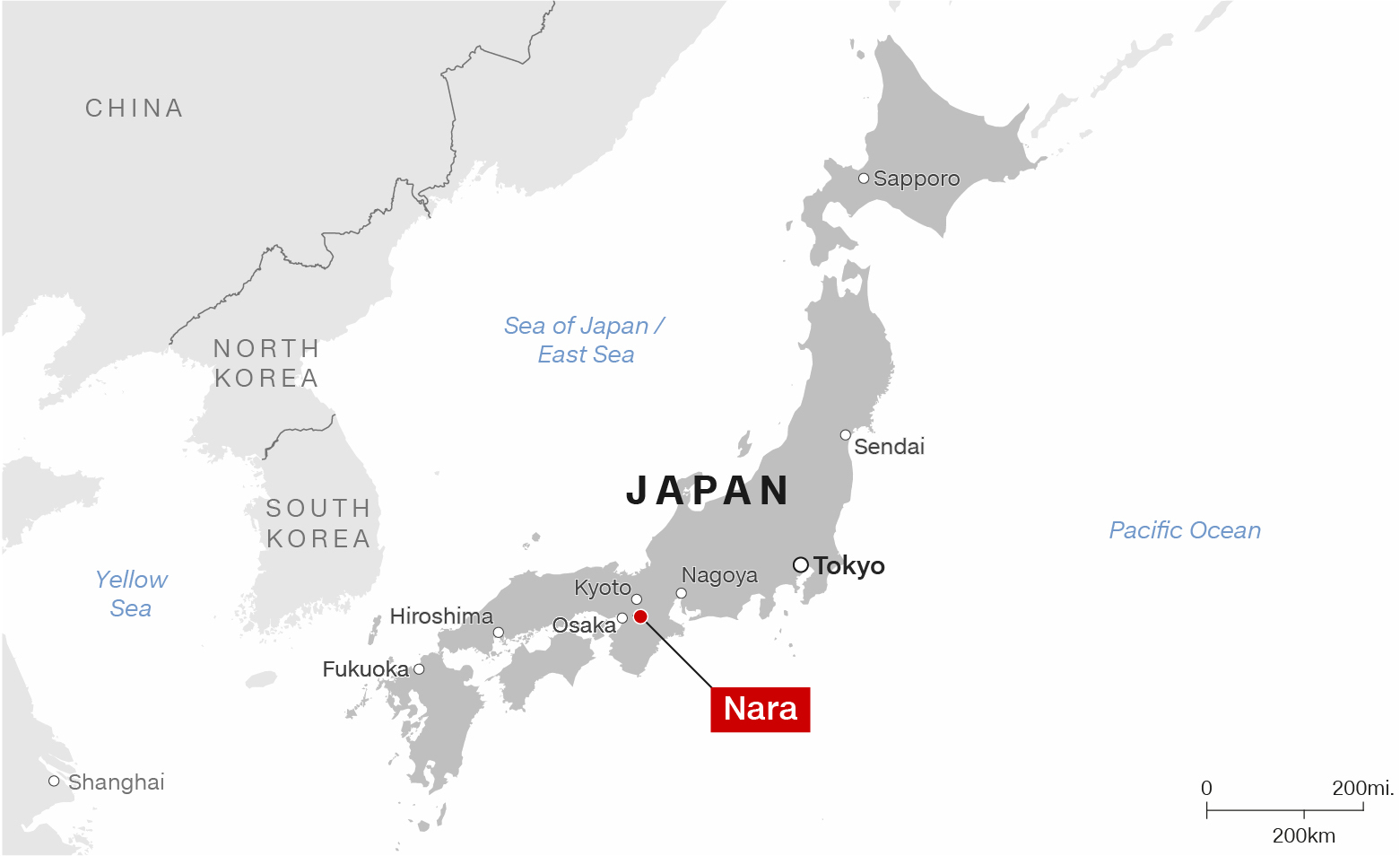
The suspect: Police arrested shooting suspect Tetsuya Yamagami, 41, who admitted to shooting Abe. According to police, Yamagami said he holds hatred toward a certain group, which he thought Abe was linked to. He used a homemade gun in the shooting, and authorities confiscated several handmade pistol-like items from his apartment, police said.
Shootings are extremely rare in Japan because of strict gun ownership laws: In 2018, Japan, a country of 125 million people, only reported nine deaths from firearms — compared with 39,740 that year in the United States. Under Japan’s firearms laws, the only guns permitted for sale are shotguns and air rifles — handguns are outlawed. But getting them is a long and complicated process that requires strenuous effort — and lots of patience. The laws and the thorough process of background checks have kept the number of private gun owners in Japan extremely low.
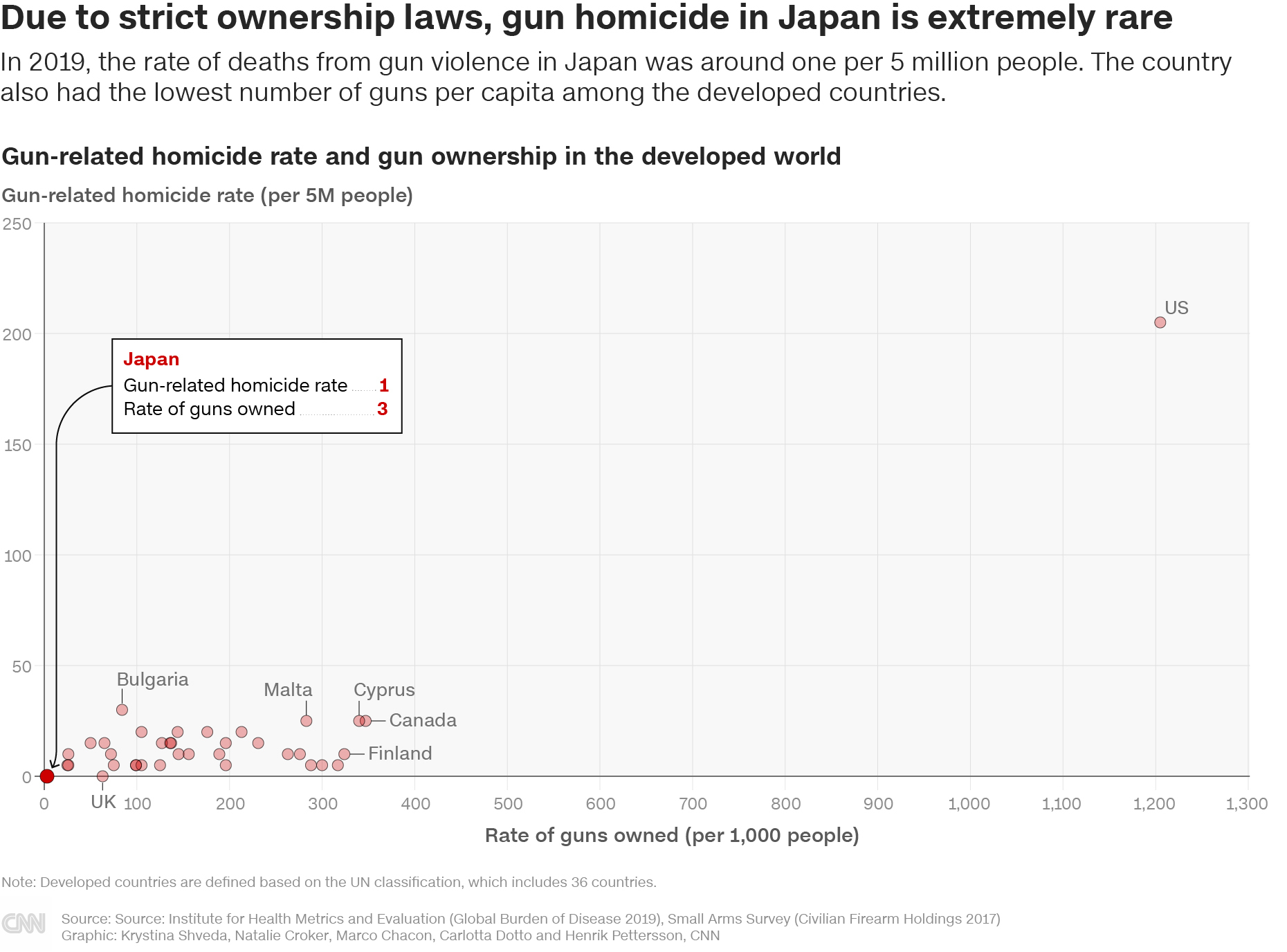
Here’s a look at the legacy of Shinzo Abe, Japan’s longest-serving prime minister
From CNN staff
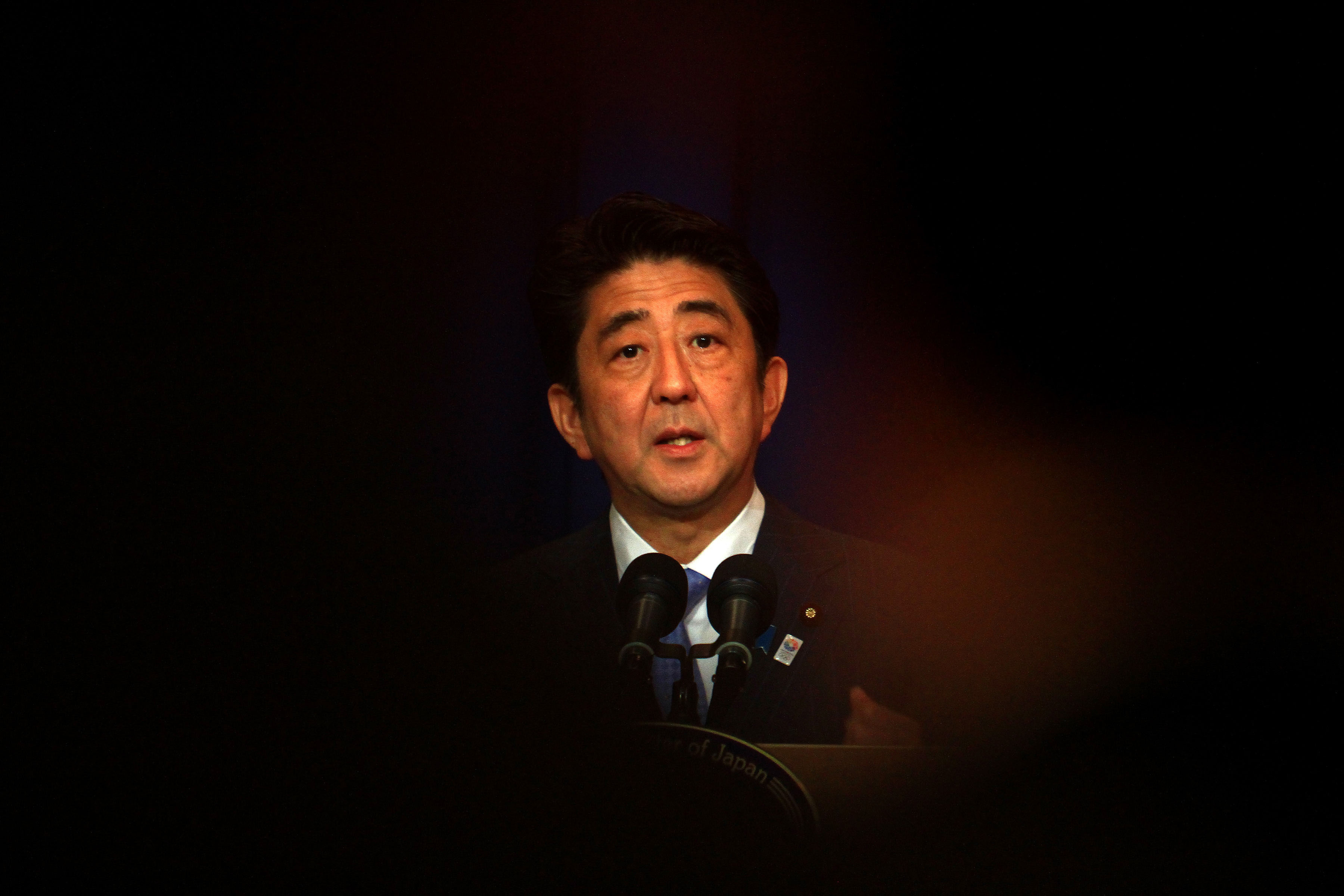
Japan’s former Prime Minister Shinzo Abe died after being shot during a campaign speech Friday in Nara. He was 67.
Abe served two separate terms as the Japanese leader for the right-leaning Liberal Democratic Party (LDP) — the first from 2006 to 2007, then again from 2012 until 2020. His second stint was the longest consecutive term for a Japanese head of government.
He came from a family of Japanese prime ministers
Abe was born on Sept. 21, 1954, in Tokyo, to a prominent political family. Both his grandfather and great uncle served as prime minister, and his father was a former secretary general of the LDP.
Abe was first elected to Japan’s House of Representatives in 1993, at age 38. He held a number of cabinet positions throughout the 2000s, and in 2003 became secretary general of the LDP. Four years later, he was named the party’s president and became prime minister of Japan.
His first term was marred by controversies and worsening health, and he stepped down as party leader and prime minister in 2007. The end of Abe’s first term opened a revolving door in which five different men held the prime minister post in five years until his re-election in 2012. He stepped down in 2020 citing ill health.
He continued to be an influential leader after leaving office
After leaving office, Abe remained head of the largest faction of the ruling LDP and remained influential within the party. He has continued to campaign for a stronger security policy and last year angered China by calling for a greater commitment from allies to defend democracy in Taiwan. In response, Beijing summoned Japan’s ambassador and accused Abe of openly challenging China’s sovereignty.
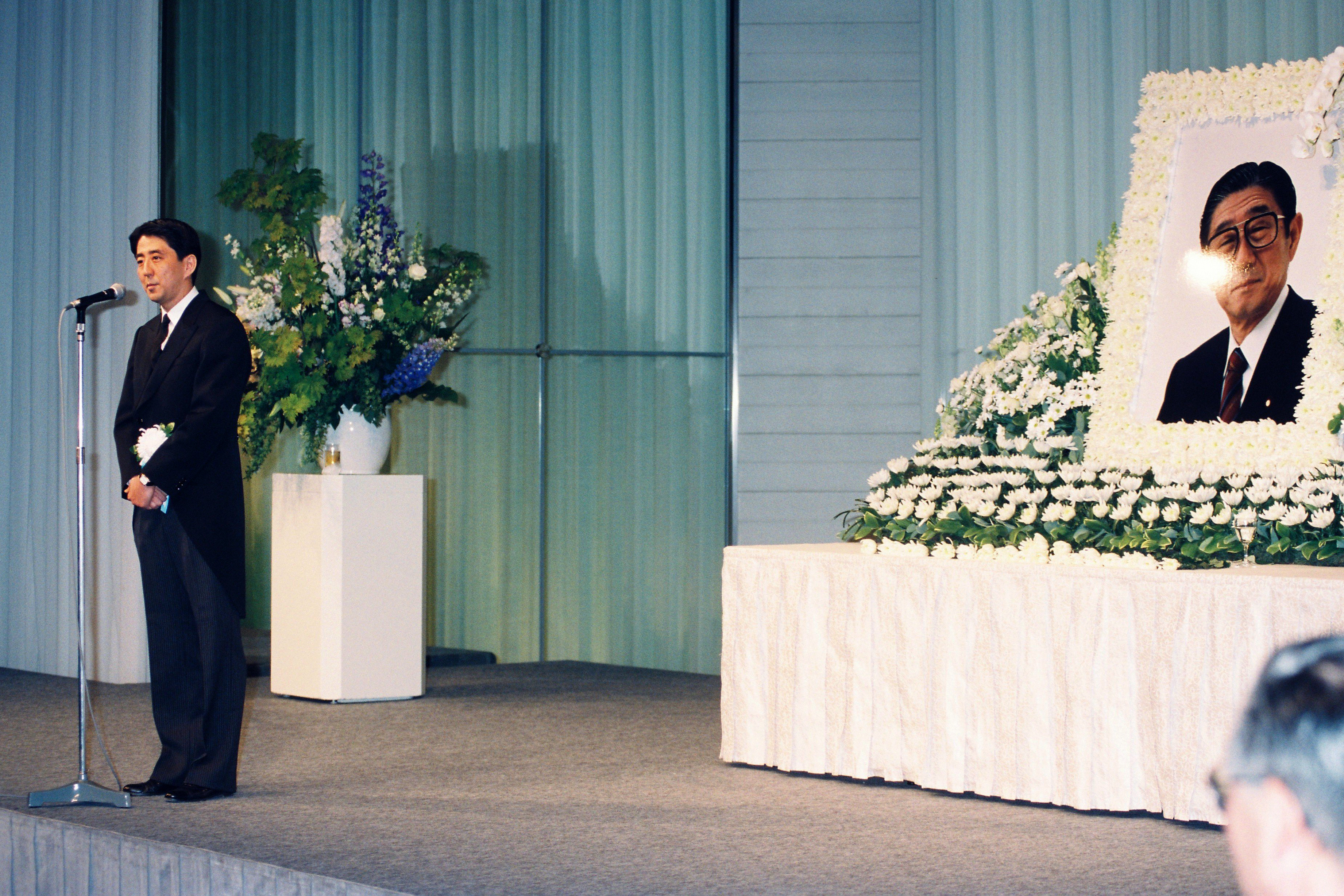
Abe redefined Japan’s diplomatic and military policy
Abe will be remembered for boosting defense spending and pushing through the most dramatic shift in Japanese military policy in 70 years. In 2015, his government passed a reinterpretation of Japan’s postwar, pacifist constitution, allowing Japanese troops to engage in overseas combat — with conditions — for the first time since World War II.
Abe argued the change was needed to respond to a more challenging security environment, a nod to a more assertive China and frequent missile tests in North Korea.
During his term, Abe sought to improve relations with Beijing and held a historic phone call with Chinese leader Xi Jinping in 2018. At the same time, he tried to counter Chinese expansion in the region by uniting Pacific allies.
He attempted to build a personal relationship with former United States President Donald Trump. As Washington’s relationship with Pyongyang tipped toward diplomacy, with both Trump and South Korean President Moon Jae-in holding historic summits with North Korean leader Kim Jong Un, Abe said he was “determined” to meet Kim. Abe wanted to normalize relations with North Korea and ease tensions on the Korean Peninsula, but his first priority was to bring some closure for the families of Japanese citizens abducted by North Korea in the 1970s and 80s.
During his tenure, Japan’s relations with South Korea soured. The two countries were engaged in a major dispute in which trade and military intelligence deals were scrapped, partly due to the legacy of World War II and Japan’s brutal colonization of the Korean Peninsula.
The “Abenomics”
Abe came to office during a time of economic turmoil and soon set about rebooting Japan’s economy after decades of stagnation. Soon after he was re-elected prime minister in 2012, he launched a grand experiment popularly known as “Abenomics.”
It included three so-called arrows — massive monetary stimulus, increased government spending, and structural reforms.
After a strong start, it faltered and in 2015, Abe fired “three new arrows” designed to boost gross domestic product. Any hopes they might eventually hit their mark were dashed when Covid-19 swept through the country in 2020, tipping Japan into recession.
One of Abe’s major domestic achievements was securing the 2020 Tokyo Olympics. But the success of the much anticipated Tokyo Games was ultimately undone by the Covid-19 pandemic, which forced the competition to be postponed to 2021.
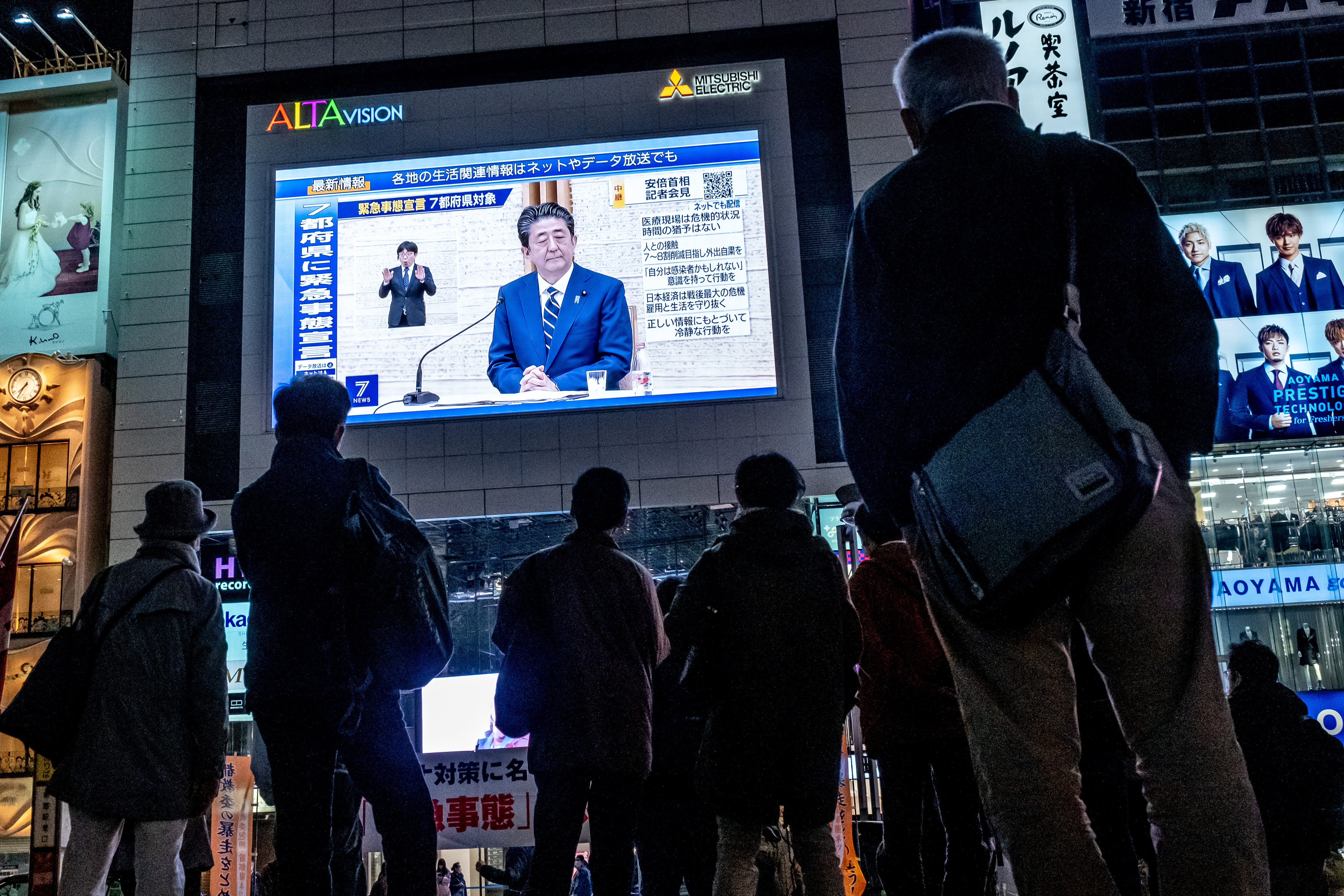
Abe declared a state of emergency months after the first cases were detected. His administration was also criticized for the low rate of testing, and an early lack of specialist medical equipment to treat the rising number of patients.
More successful was Abe’s handling of the abdication of Emperor Akihito, the first Japanese monarch to step down in two centuries. He was succeeded by his son, Emperor Naruhito, in October 2019, starting the Reiwa era.
Abe is survived by his wife Akie Abe, née Matsuzaki, who he married in 1987. The couple did not have children.
Read more about his legacy here and see his life in photos here.
Biden orders flags be lowered to half-staff following Abe’s death
From CNN’s DJ Judd
US President Joe Biden is ordering flags to be lowered to half-staff until July 10 following the death of former Japanese Prime Minister Shinzo Abe, writing in a presidential proclamation that the late PM “was a proud servant of the Japanese people and a faithful friend to the United States.”
“He worked with American Presidents of both parties to deepen the Alliance between our nations and advance a common vision for a free and open Indo-Pacific,” Biden wrote Friday. “Even in the moment he was attacked and killed, he was engaged in the work of democracy, to which he dedicated his life.”
Biden also signed a condolence book for Abe at the Japanese ambassador’s residence in Washington, DC. He laid a small wreath of flowers on the table as well.
Japanese Ambassador to the US Koji Tomita greeted Biden for the condolence book signing, according to reporters traveling with the President.
CNN’s Aaron Pellish contributed reporting for this post.
Correction: A earlier version of this post incorrectly described where Biden signed a condolence book for Abe. It was at the Japanese ambassador’s residence.
Leaders recall “a kind and decent man” who worked to “bring balance” to the world
From CNN staff
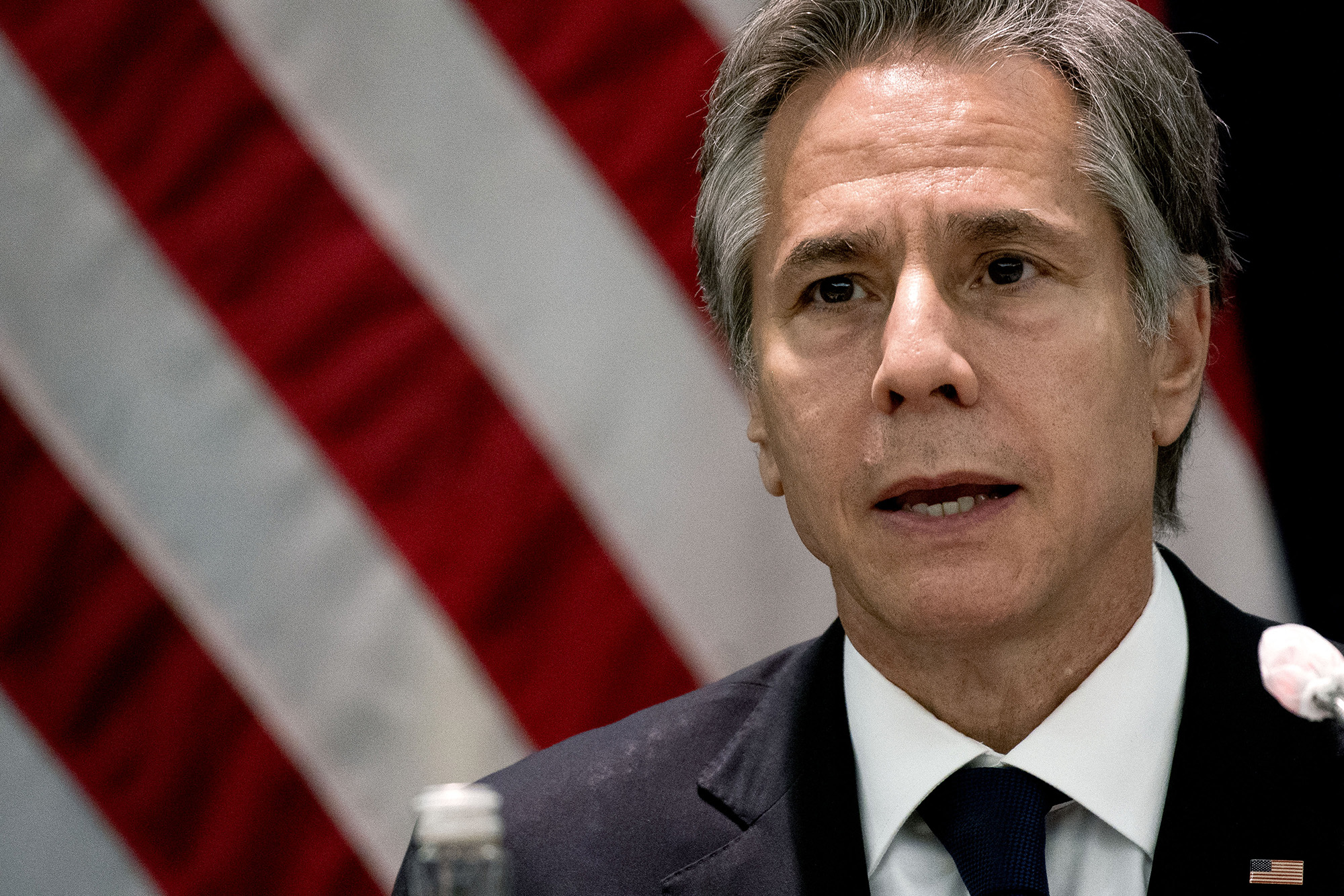
Tributes to Shinzo Abe have continued to pour in from politicians around the world, many of whom recalled their visits with the former leader and expressed their shock at his killing.
French President Emmanuel Macron said “Japan has lost a great prime minister.”
“On behalf of the French people, I send my condolences to the Japanese authorities and people after the assassination of Shinzo Abe. Japan has lost a great Prime Minister, who dedicated his life to his country and worked to bring balance to the world,” Macron tweeted.
US Secretary of State Antony Blinken called Abe’s assassination “shocking,” and praised Abe as “a leader with great vision” and an “extraordinary partner,” who took US-Japanese relations “to new heights.”
“It’s profoundly disturbing in and of itself, it’s also such a strong personal loss for so many people,” Blinken said Friday.
A number of former leaders who worked with Abe during his time as Japanese prime minister also offered their condolences.
Former British Prime Minister David Cameron said Abe was “a good friend personally, a strong partner to the UK, and a thoroughly kind and decent man.” He called his death “devastating and truly shocking.”
Israel’s ex-leader Benjamin Netanyahu said he “will always remember Shinzo Abe and cherish our deep friendship,” while Nicolas Sarkozy, the former French prime minister, called him “a great leader who left his mark on Japan.”
Canadian Prime Minister Justin Trudeau called Abe’s death “incredibly shocking,” adding that he was “deeply saddened.” Trudeau tweeted, “The world has lost a great man of vision, and Canada has lost a close friend. My thoughts are with his wife, Akie, and the people of Japan as they mourn this loss. You’ll be missed, my friend.”
Brazilian President Jair Bolsonaro called Abe “a brilliant leader” in a tweet Friday. “I receive with extreme indignation and grief the news of the death of @AbeShinzo, a brilliant leader who was a great friend of Brazil. I extend to Abe’s family, as well as to our Japanese brothers, my solidarity and my wish that God watch over their souls in this moment of pain,” he said.
Ukrainian President Volodymyr Zelensky sent his “deepest condolences” to Abe’s family and the people of Japan. “Horrible news of a brutal assassination of former Prime Minister of Japan Shinzo Abe. I am extending my deepest condolences to his family and the people of Japan at this difficult time. This heinous act of violence has no excuse,” Zelensky tweeted.
Taiwanese President Tsai Ing-wen said she was “extremely pained” by Abe’s passing, referring to the late leader as “the staunchest friend of Taiwan.” Tsai Ing-wen said Abe was “an old friend” she had known “for more than a decade.”
UN Secretary General António Guterres tweeted his condolences over Abe’s assassination. “I’m deeply saddened by the horrific killing of Shinzo Abe, former Prime Minister of Japan,” Guterres said. “I had the privilege of knowing him for years & will always remember his collegiality & commitment to multilateralism. My condolences to his family, and the people & Government of Japan.”
Former US President Barack Obama said he’s “shocked and saddened” by Abe’s assassination. In a statement, he recounted the close relationship the two leaders forged during his second term in office and the “extraordinary alliance” between the two nations. In 2016, Obama traveled to Hiroshima with Abe — becoming the first sitting US president to do so — and later that year, Abe returned the gesture, becoming the first Japanese prime minister to visit Pearl Harbor.
Former US President George W. Bush, who worked with Abe during his first stint as Japanese prime minister in 2006, said in a statement that he was “deeply saddened to learn of the senseless assassination,” adding that “Shinzo Abe was a patriot of his country who wanted to continue serving it.”
Queen Elizabeth II, in a message of condolence to the emperor of Japan, said Abe’s “love for Japan, and his desire to forge ever-closer bonds with the United Kingdom, were clear. I wish to convey my deepest sympathy and condolences to his family and to the people of Japan at this difficult time.”
Japan had only one gun-related death reported in 2021
From CNN’s Mayumi Maruyama in Hong Kong
Japan reported only one death due to firearms in 2021, according to the National Police Agency. A total of 10 firearm-related incidents were reported in the country in 2021 — up from seven in 2020.
Eight of the 10 reported incidents were gang-related, the agency’s report states.
In the past five years, the highest number of firearm-related deaths per year reported in Japan was four.
The data indicates just how rare gun violence is in Japan, which can be credited to its strict gun ownership laws and thorough background check processes.
Read more about Japan’s gun laws here and see how the country’s laws and gun-related homicide rates compare to other nations in the chart below:
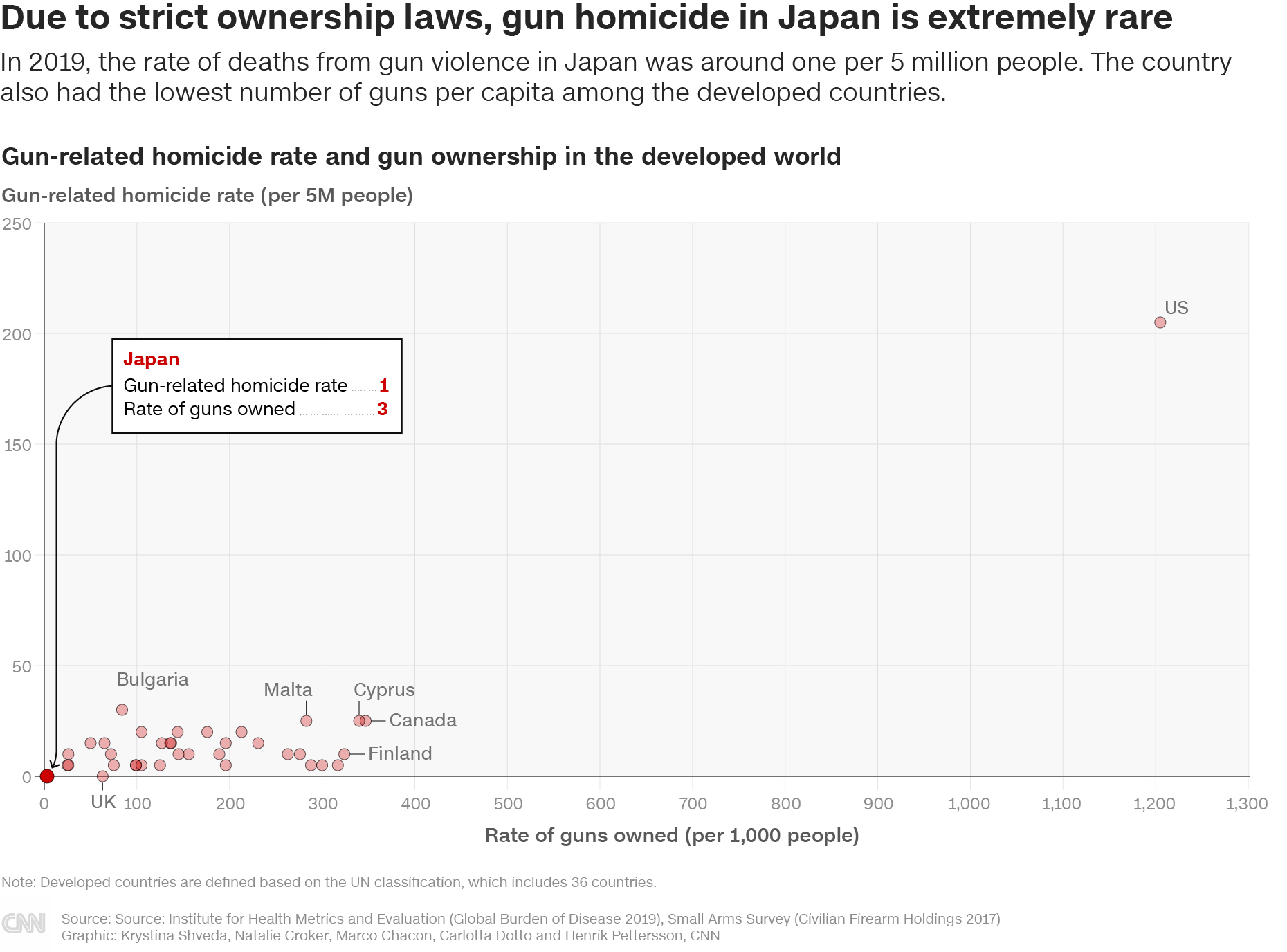
Abe assassination will be equivalent to JFK shooting for Japan, former adviser says

Tomohiko Taniguchi, a special adviser to former Japanese Prime Minister Shinzo Abe, said Abe was “one of the most transformative leaders” of Japan.
“I think it’s going to be an equivalent of JFK’s assassination day. … It’s been a day of sadness, grief, disbelief, and for me, tremendous anger. People are finding it very much hard to digest the reality. I think it’s very much an isolated event conducted by very much an isolated person. Nonetheless, that isolated incident killed one of the most transformative leaders of the Japanese history,” he said.
He recalled Abe as a kind man and someone who wanted to usher Japan forward.
“He and Mrs. Abe did not have their own child, and he wanted to bring Japan to the younger generations as a country that is prosperous and future-oriented,” he said.
“Once you are befriended with him, you get a lifelong friend,” he added.
Taniguchi was an adviser to Abe from 2013-2014 and wrote foreign policy speeches for the former leader.
“I would very much like to see his legacy lasting, because there are very few options available for Japan. It’s a maritime nation, and it’s sitting on the periphery of a huge land mass which is being dominated by three nuclear power nations — Russia, North Korea, China — none of which is democratic. So Japan badly needs alliance partners like the United States, which Shinzo Abe tried very much hard to do,” he added.
Shootings are extremely rare in Japan because of strict gun ownership laws
From CNN’s Nectar Gan
The shooting of former Prime Minister Shinzo Abe has shocked Japan, which has one of the lowest rates of gun crime in the world due to its extremely strict gun ownership laws.
The suspect in Friday’s shooting used a handmade gun, police said.
Gun violence is extremely rare in Japan.
In 2018, Japan, a country of 125 million people, only reported nine deaths from firearms — compared with 39,740 that year in the United States.
Under Japan’s firearms laws, the only guns permitted for sale are shotguns and air rifles — handguns are outlawed. But getting them is a long and complicated process that requires strenuous effort — and lots of patience.
To buy a gun in Japan, potential buyers must:
- Attend an all-day class
- Pass a written test
- Pass a shooting-range test with an accuracy of at least 95%
- Undergo mental health evaluation and drug tests
- Undergo a rigorous background check — including a review of their criminal record, personal debt, involvement in organized crime and relationships with family and friends.
After obtaining a gun, the owner must register their weapon with police and provide details of where their gun and ammunition is stored, in separate, locked compartments. The gun must be inspected by the police once a year, and gun owners must retake the class and sit an exam every three years to renew their license.
The restrictions have kept the number of private gun owners in Japan extremely low.
Read more here.

Abe assassination suspect admitted to shooting him, police say
From CNN’s Jake Kwon
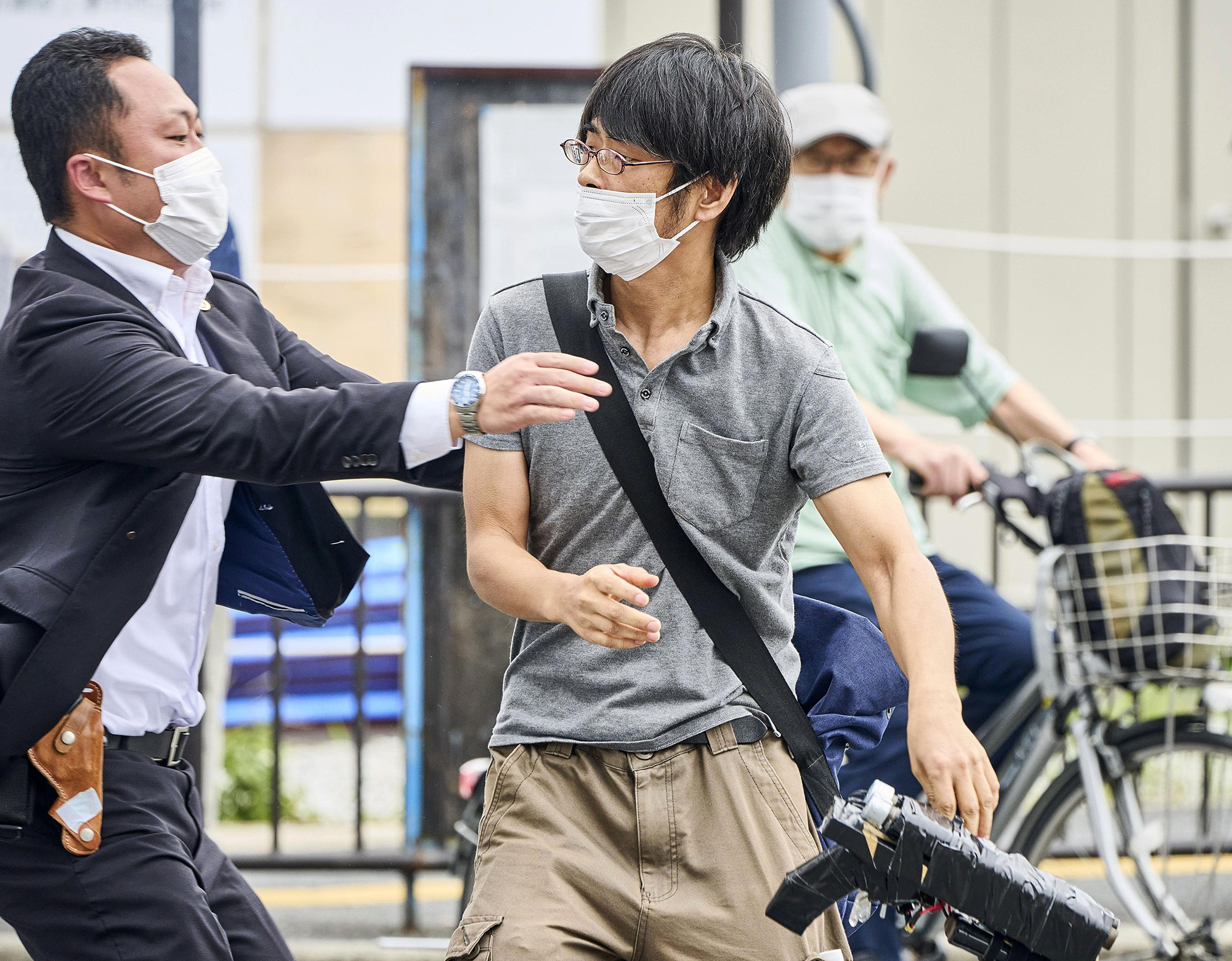
The suspect in the assassination of Shinzo Abe admitted to shooting the former prime minister, police said at a news conference Friday.
According to Nara-nishi police, Yamagami Tetsuya, a 41-year-old unemployed man, said he holds hatred toward a certain group, which he thought Abe was linked to.
Biden “stunned, outraged, and deeply saddened” by Abe’s death
From CNN’s DJ Judd
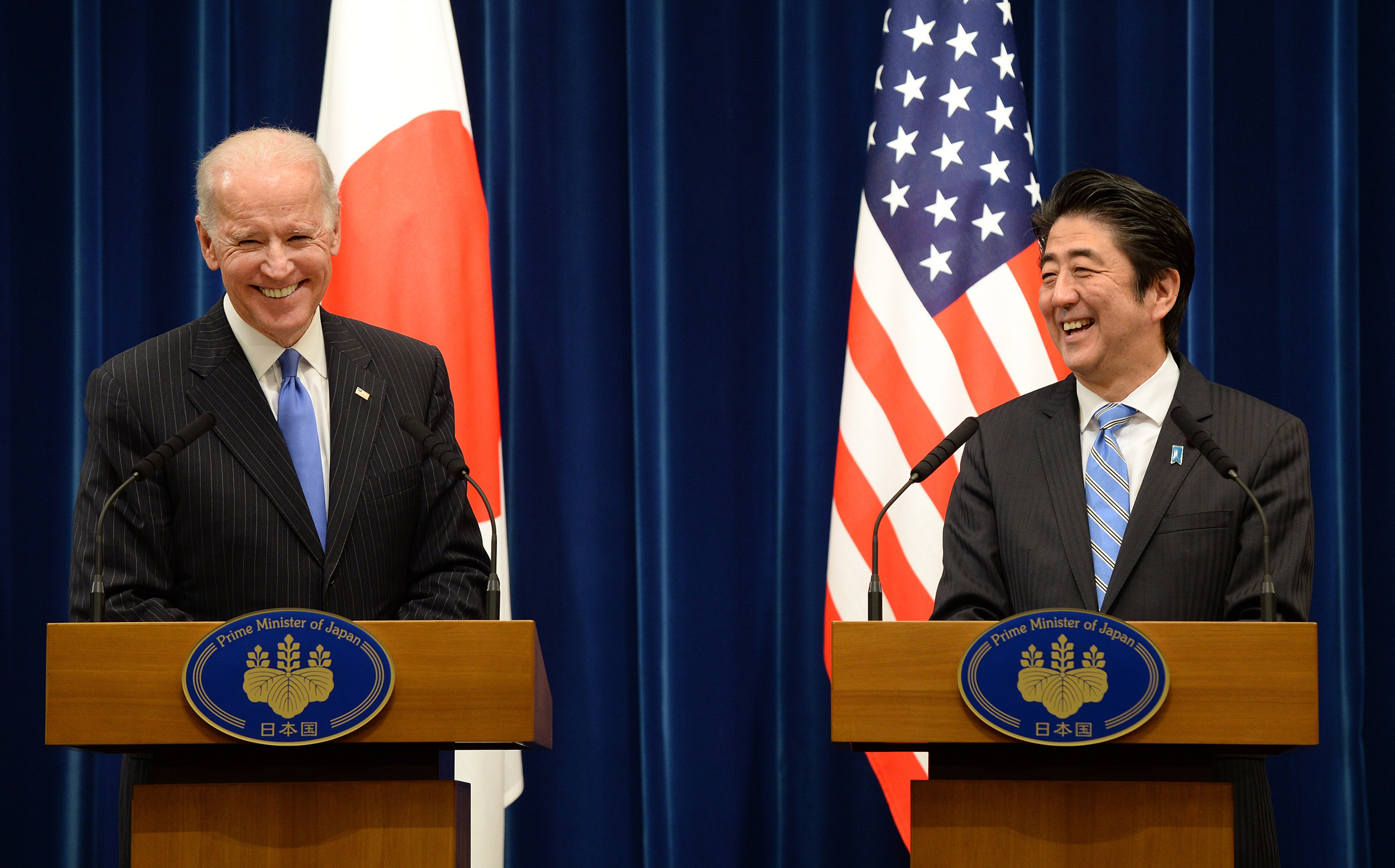
US President Joe Biden said he was “stunned, outraged, and deeply saddened” by the death of former Japanese Prime Minister Shinzo Abe on Friday.
“Above all, [Abe] cared deeply about the Japanese people and dedicated his life to their service. Even at the moment he was attacked, he was engaged in the work of democracy,” Biden wrote in a statement. “While there are many details that we do not yet know, we know that violent attacks are never acceptable and that gun violence always leaves a deep scar on the communities that are affected by it. The United States stands with Japan in this moment of grief. I send my deepest condolences to his family.”
Abe maintained a close relationship with the United States during his time as prime minister, traveling with then-President Barack Obama to Pearl Harbor in 2016 and, later that year, becoming the first world leader to meet with then-president elect Donald Trump in New York, just two weeks after his election. As vice president, Biden met with Abe both in Tokyo and Washington.
Earlier Friday, a White House spokesperson told CNN’s Jeremy Diamond that the White House was “shocked and saddened” by Abe’s shooting.
Biden told reporters Friday that he’s reached out to Japanese Prime Minister Fumio Kishida following the assassination of the former prime minister, adding that he planned to stop by the Japanese embassy to sign a condolence book later on in the day.
He said that right now, he does not believe Abe’s death will “have any profound destabilizing impact on Japanese security or Japanese solidarity,” adding that Japan is a “very, very stable ally.”
The President noted, “this is the first use of a weapon to murder someone in Japan,” to date this year, while the US has had “between 3 and 4,000 cases.”
He said as investigations continue, the FBI will give the President more details.
Source: https://www.cnn.com/asia/live-news/shinzo-abe-japan-pm-collapses-nara-07-08-22-intl-hnk/index.html















